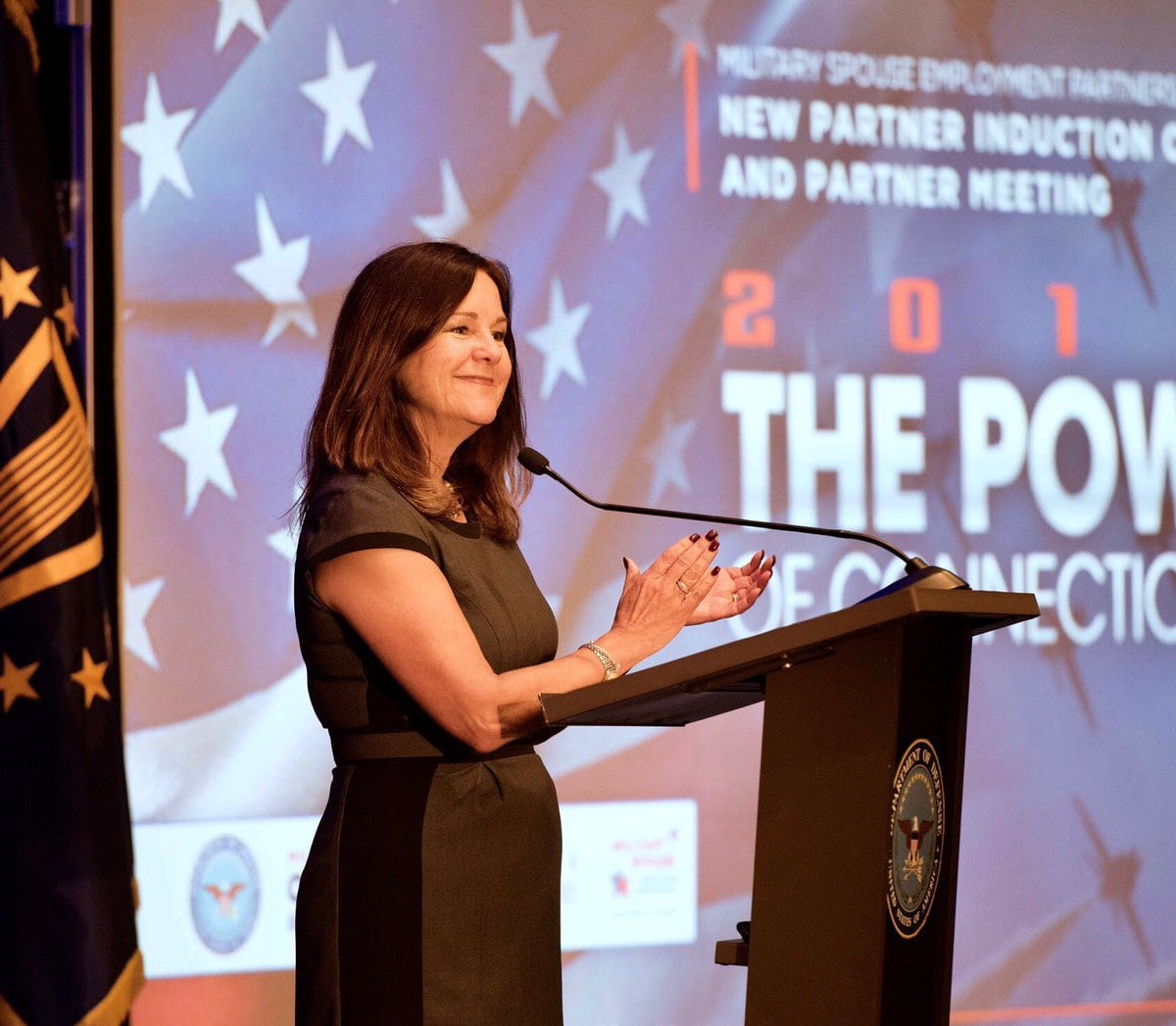Military spouses’ employment problems hurt not only their families’ current finances, but the effects often snowball to affect their financial future into retirement, according to a new report based on an online poll of 4,118 spouses.
Nearly half of those who responded said they don’t feel confident they’ll be able to maintain their standard of living in retirement, according to the report titled “The Hidden Financial Costs of Military Spouse Unemployment.” And their responses indicate spouses’ average total savings represent a “small fraction” of what they’ll need in retirement.
The survey and study were conducted by the U.S. Chamber of Commerce Foundation’s Hiring our Heroes and Syracuse University’s D’Aniello Institute for Veterans and Military Families (IVMF). The online survey was fielded from Feb. 16 to March 9.
The survey was open to civilian military spouses who have never served in the military themselves and who are married to an active duty, reserve or National Guard member; retiree or veteran. About 59% of the survey participants are married to enlisted personnel (42% in grades E-5 to E-7), and 39% are married to commissioned officers.
The vast majority — 80% — of the respondents are active duty spouses, and 90% said their spouse’s military service negatively affects their career. Of those surveyed, 16% are not in the labor force and aren’t actively seeking work. But among the group of spouses who are participating in the labor force, 68% are employed and 32% reported being unemployed — they’d actively sought work in the previous four weeks. For years, the unemployment rate for military spouses has hovered around 22%, although the numbers vary widely. Some polls have shown the pandemic has exacerbated the employment problems of military spouses.
And spouses report underemployment — 88% said the military lifestyle affects their ability to get a job at their experience and/or education level.
While many spouses are focused on the effects their employment situation and loss of income is having on their family now, they may not be thinking about the consequences down the road. The study’s researchers urge more study of the economic impact of military spouses’ total lost wages, including retirement savings, as a result of the constant military moving and other issues associated with the military lifestyle.
“Often when we’re talking about retirement in military families, we’re looking at it from the service member first and not talking about the military spouse’s retirement,” said Hisako Sonethavilay, senior adviser of research and innovation for Hiring Our Heroes.. “It was important for us to look at the spouse and how they’re doing as an individual.”
She said Hiring Our Heroes was approached by First Command Financial Services about doing the research, focusing on military spouses’ own retirement readiness, and how employment plays a key part in that. First Command funded this research.
“I think more people need to be talking about this, especially when talking about military spouses,” she said. “Military spouses may have never considered the role of retirement benefits when looking at a compensation package.” Spouses need to be armed with knowledge, to make decisions to get the most out of retirement plans they have access to, she said.
Spouses’ level of confidence about maintaining their standard of living in retirement shrinks if they’ve stopped working or have had multiple periods of unemployment, the researchers found, and military spouses can’t contribute to their retirement without adequate income.
“I definitely would like to have had my own opportunity to invest in a retirement plan,” one military spouse participant told researchers. “It wasn’t until the last five years that I realized that I don’t have something. … My husband isn’t worried because he said we have his pension/retirement. However, what happens if something happens to my husband?
“It’s very nerve-wracking.”
The report notes that the participants’ total savings represents a “small fraction” of what they’ll need in retirement: Employed active duty spouses have saved, on average, between $31,000 and $40,000. For unemployed spouses, it dropped to an average of $21,000 to $30,000.
Researchers didn’t collect information about the average amount of savings spouses of retirees had amassed going into retirement, and how their retirement savings had an impact on their standard of living as they actually moved into retirement. Fifteen percent of the respondents were identified as veteran/retiree spouses; 4% were Guard or reserve spouses.
The report cites one study by the TransAmerica Center for Retirement Studies in 2019 which found women need to save a median amount of $500,000 to feel financially secure in retirement. In the military spouse study, 92% of the participants were women. While the report doesn’t specify ages, the majority of the spouses likely have decades to go before reaching the usual retirement age, in their 60s. The report does note that 46% of the respondents have been married to their service member 11 years or more; and 54% married 10 years or less.
RELATED

Employer retirement plans are key
Of the active duty spouse respondents, 82% have, or have had, access to employer-sponsored retirement benefits such as 401(k) plans at some point since they started working full time and were married to their service member, according to the researchers. Information was not available about how many of those active duty spouses actually contribute or have contributed to plans.
These plans allow employees to make contributions from their paychecks into investment accounts for retirement, which always belong to the employee. Many employers also match a portion of an employee’s contributions to the account, but those employer matching funds don’t always immediately belong to the employee. The employee is required to stay with the employer for a specific period of time before they become “vested,” or have 100% ownership of the matching funds.
One surprising finding was that access to employer-sponsored retirement benefits improves a military spouse’s outlook on retirement — if their benefits vest, Sonethavilay said. But spouses often can’t stay with one employer long enough to get “vested” in retirement benefits, because of military-related moves.
About 58% of those active duty spouses with access to these employer plans said they’re rarely or never vested in their employer’s contributions since marrying their service member and working full time.
That means lost retirement funds. That also negatively affects the spouses’ confidence in their ability to retire comfortably: More than half of spouses who aren’t confident in their ability to retire comfortably never or rarely get vested in their company matching contributions.
So, the researchers recommended finding ways to ensure spouses aren’t penalized when they have to quit a job because of a military-related move. One option is a federal retirement savings option for military spouses that provides easier management of benefits earned from multiple employers.
Another recommendation is to continue to find ways to create more career pathways for military spouses and to focus on workplace flexibility, to include remote and portable work opportunities. Defense and service officials have been pushing for these opportunities for decades.
RELATED

Another surprising finding, Sonethavilay said, is that 40% of the survey participants with long-term investment accounts aren’t very, or at all, confident in managing their accounts.
Researchers recommended promoting available free financial education and financial planning services for military spouses to help them understand the importance of saving for retirement and creating a retirement savings plan.
Among other findings:
♦ 88% say the military lifestyle affects their ability to find jobs at their experience and/or education level. 37% of the spouses have a bachelor’s degree and 38% have a master’s, professional or doctorate degree.
♦ 68% of employed active duty spouses are saving on their own, separately from what they’re saving with their service member. The number drops to 31% for those participants who are currently unemployed.
♦ Spouses reported the two most important benefits of having a long-term second income are the ability to retire comfortably (71%) and the ability to accumulate savings (60%). Next are the ability to afford the cost of everyday goods (49%); ability to buy a home (46%), and ability to send kids to college (42%).
Recruiting for the survey was conducted through social media and email; it’s not a scientific random sampling. Researchers noted that the survey results aren’t meant to represent the broader population of military spouses, and can’t be generalized to describe the experience of every military spouse. Since many of the participants are active duty spouses looking for professional career services, the survey sample overrepresents spouses of senior enlisted service members and officers.
Karen has covered military families, quality of life and consumer issues for Military Times for more than 30 years, and is co-author of a chapter on media coverage of military families in the book "A Battle Plan for Supporting Military Families." She previously worked for newspapers in Guam, Norfolk, Jacksonville, Fla., and Athens, Ga.




